VENUS PATROL PRESENTS: SPREADING LOVE & PEACE THROUGH GAMES WITH KEITA TAKAHASHI
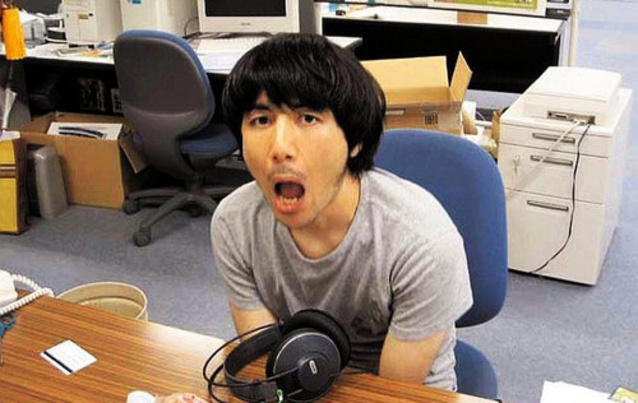
Katamari Damacy & Noby Noby Boy creator Keita Takahashi was recently invited to Australia’s Games For Change conference to deliver a speech he called “The Power Of Play: Reasons Why I Like Video Games“.
He used the opportunity to reprise a fantastic speech he gave back in 2006 for GDC’s Game Design Challenge — the theme that year was designing a game that could win the Nobel Peace Prize (which went on to be won by Dishonored designer Harvey Smith, as I covered in this interview with Smith, back in a former life) — but then moved on to cover a wide variety of topics, all revolving around the central idea of spreading peace & love through videogames.
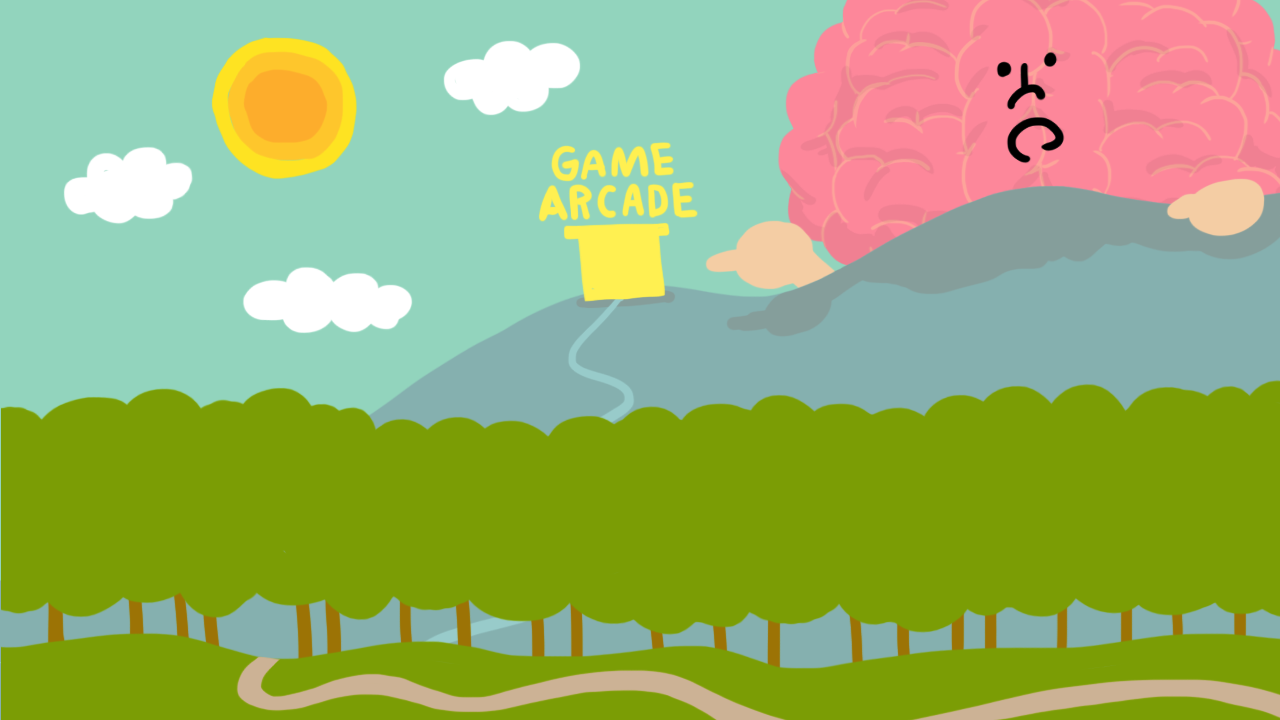
Below the fold you’ll find the entirety of Takahashi’s talk, including musings on the aesthetics of the controller & re-framing the environment around us with play (and with Kokoromi co-founder & designer Heather Kelley‘s glasses), presented here on Venus Patrol with high hopes that it’ll inspire a little more peace and love from designers and players alike.

I’d like to begin with how I interpret the existence of videogames. I think the quickest way to do that is to show you a presentation I did at the Game Design Challenge at GDC 2006. The theme was “Game for the Nobel Peace Prize”.

This may sound like a cliche, but I still believe we can come closer to achieving world peace if everyone believes in Love.
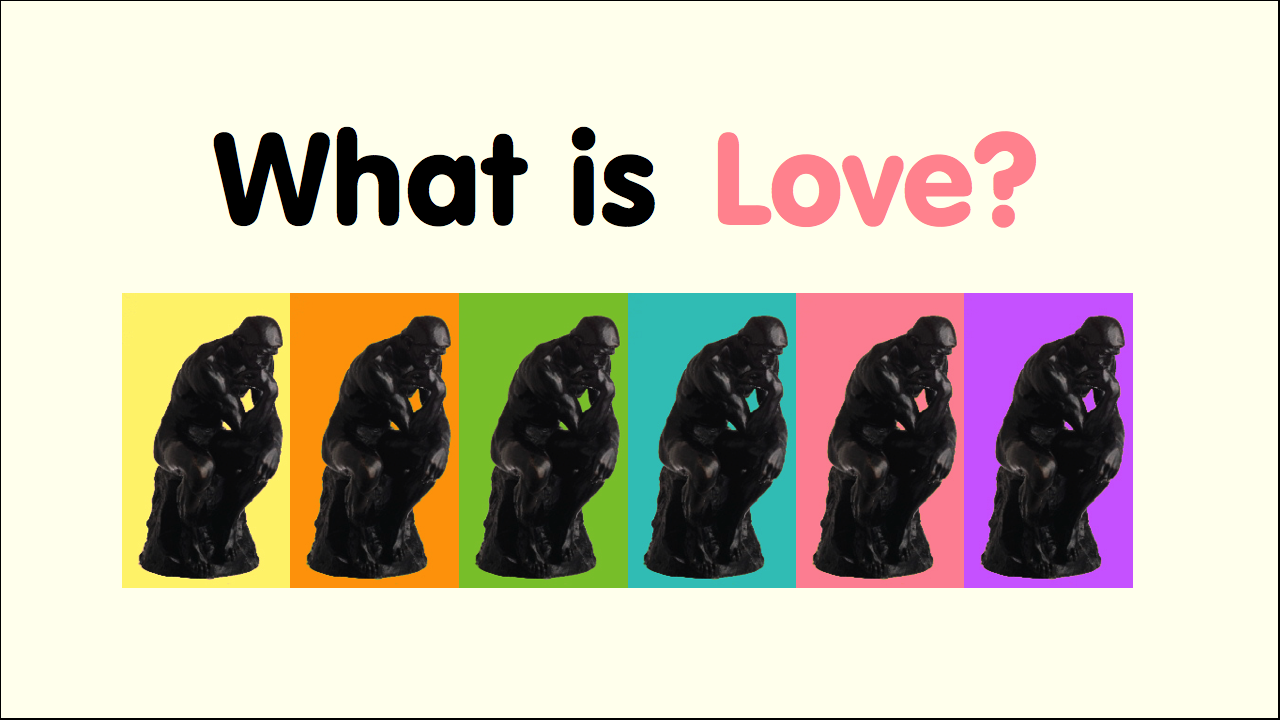
What is Love? It is the love of videogames. And this is what I think the love of videogames is…



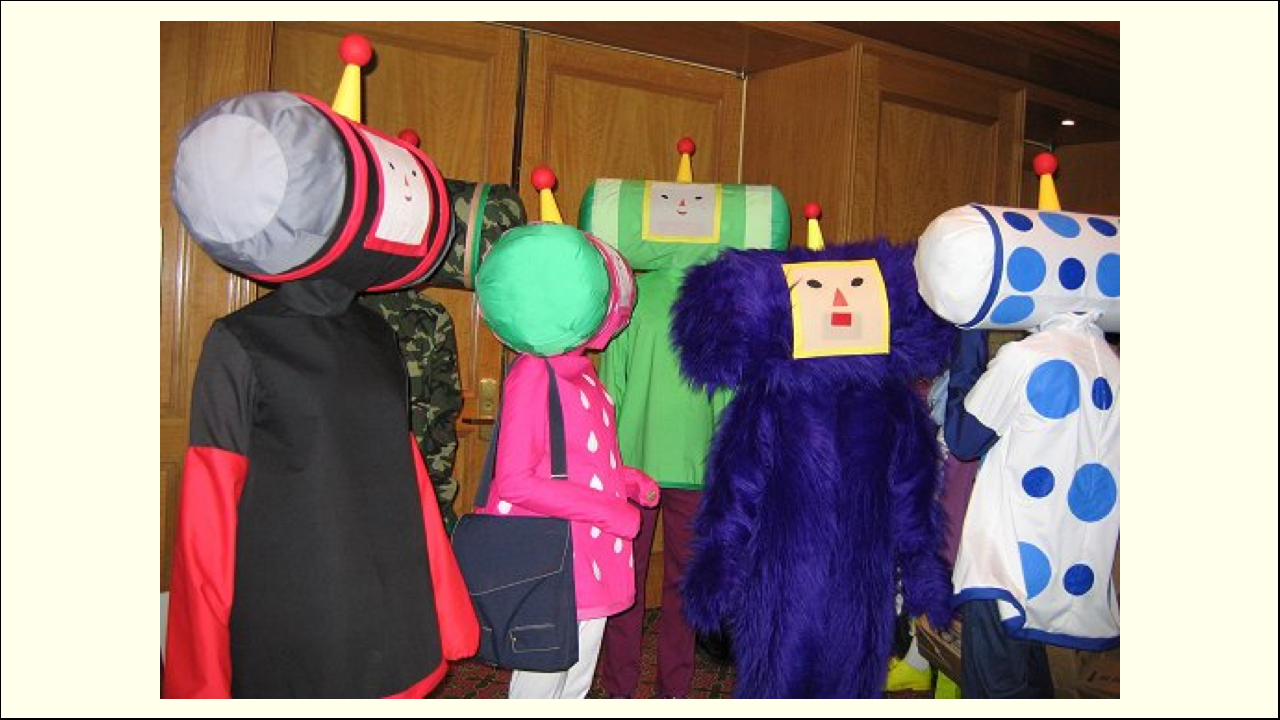
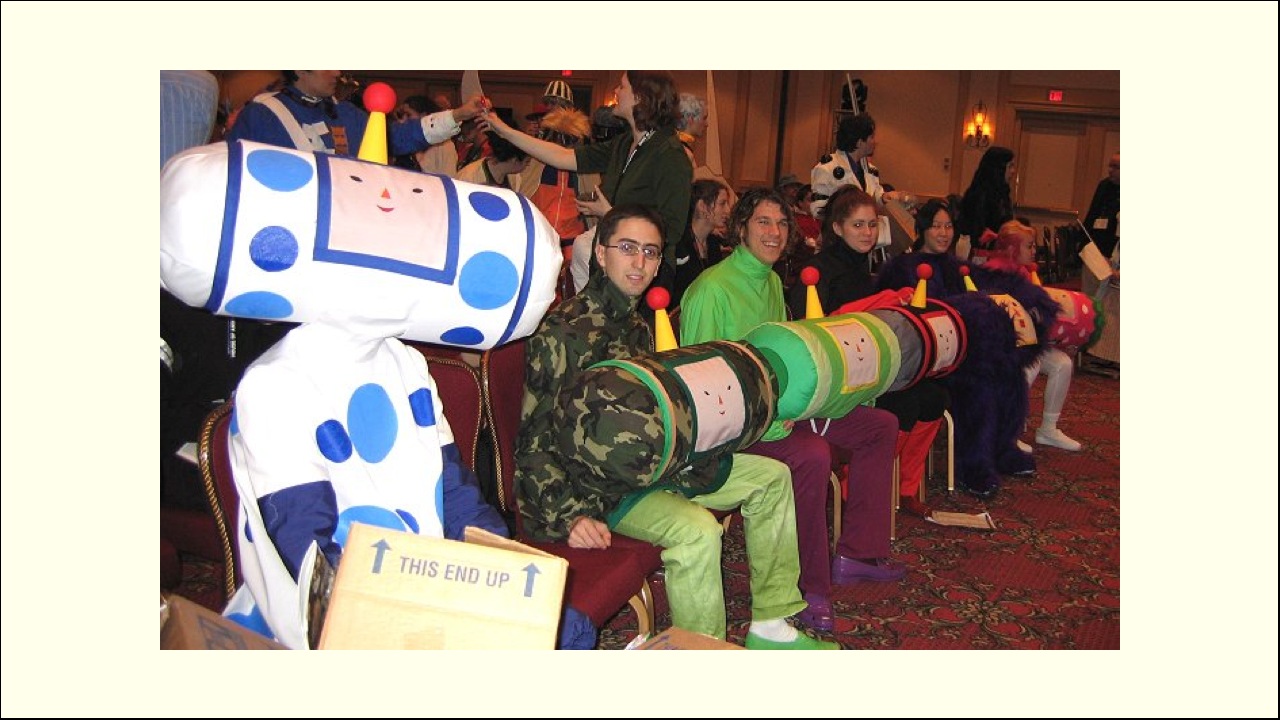

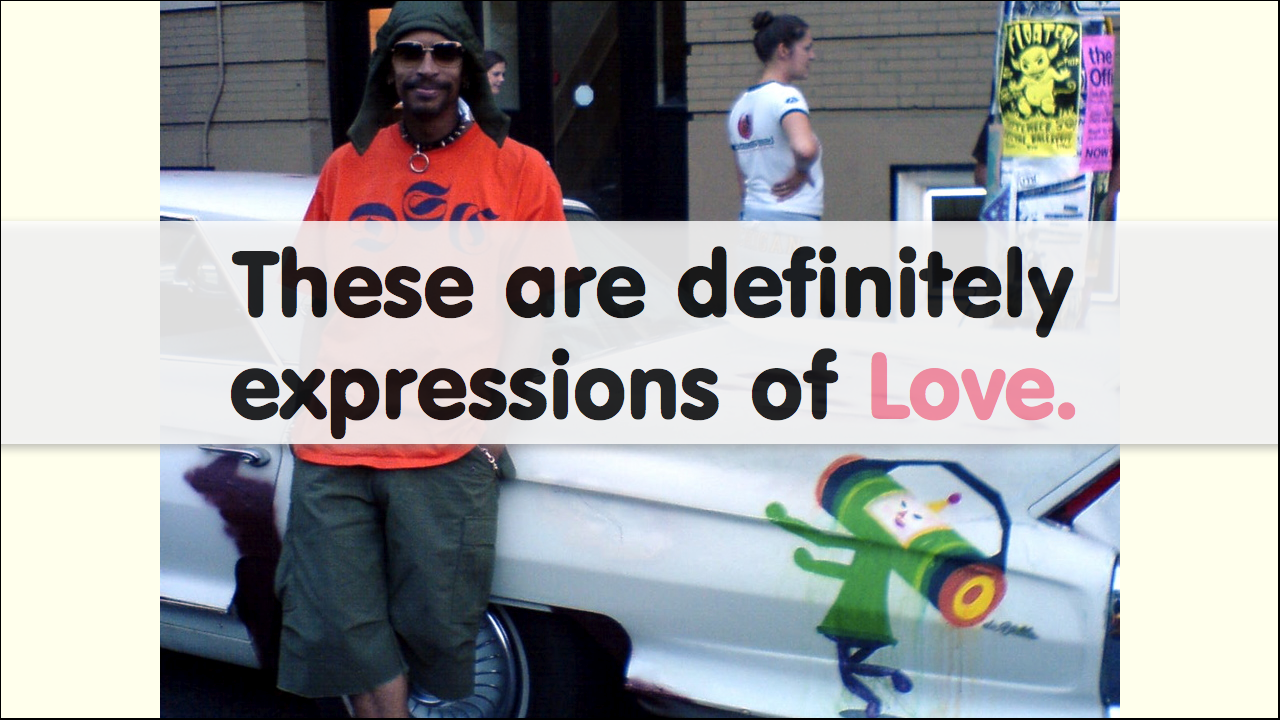
As you can see, we all share the love for videogames, because they’re simply fantastic.
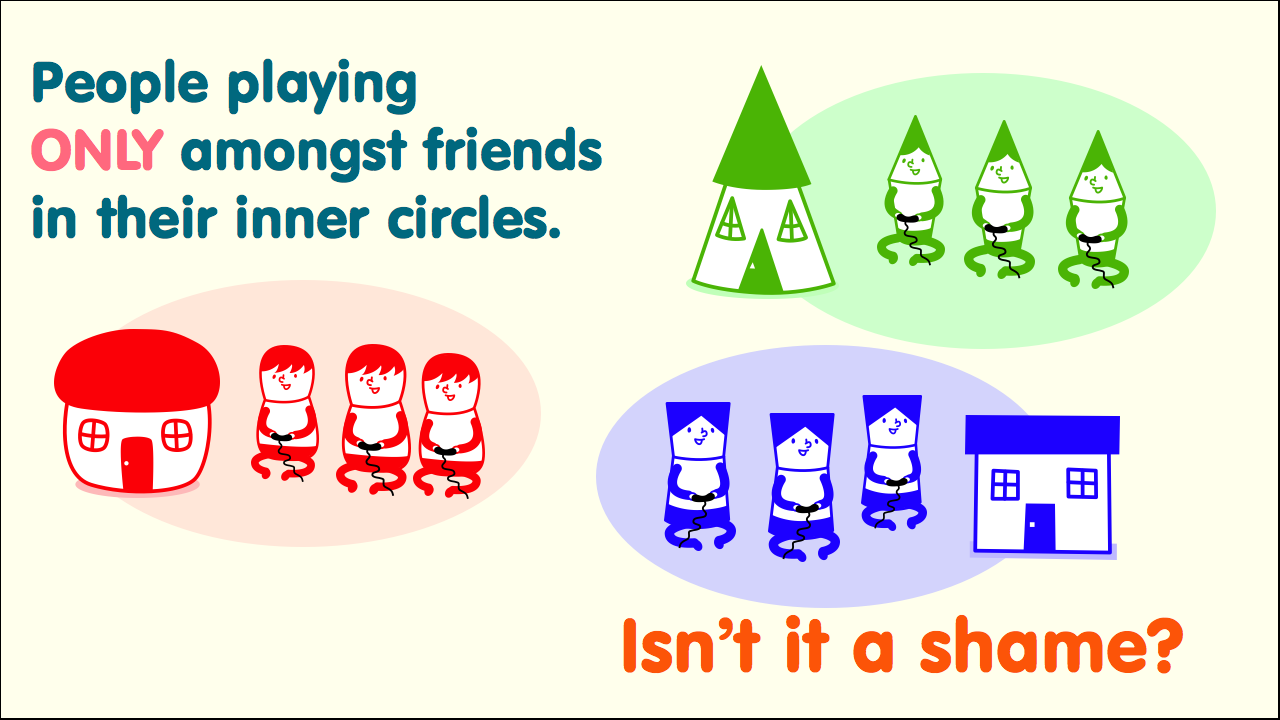
But isn’t it a shame that something as wonderful as videogames are only shared between a limited network of friends?
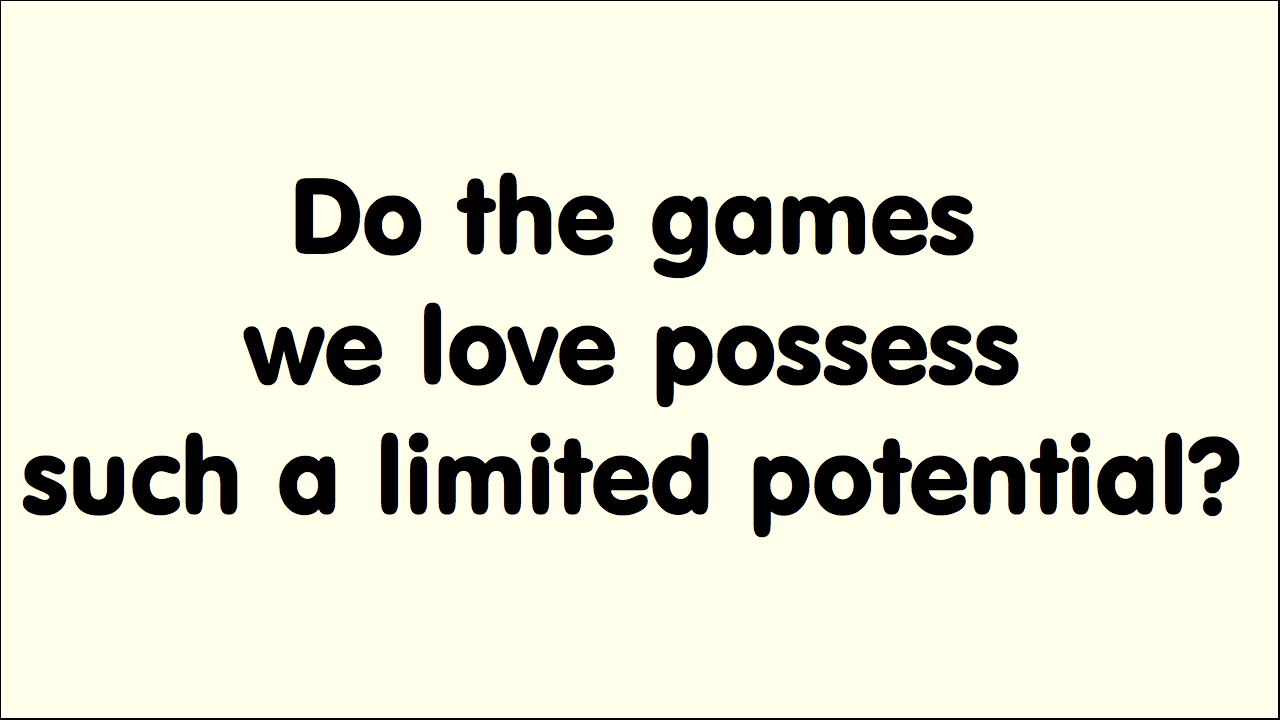
Should the videogames we love be limited to such a small scale?

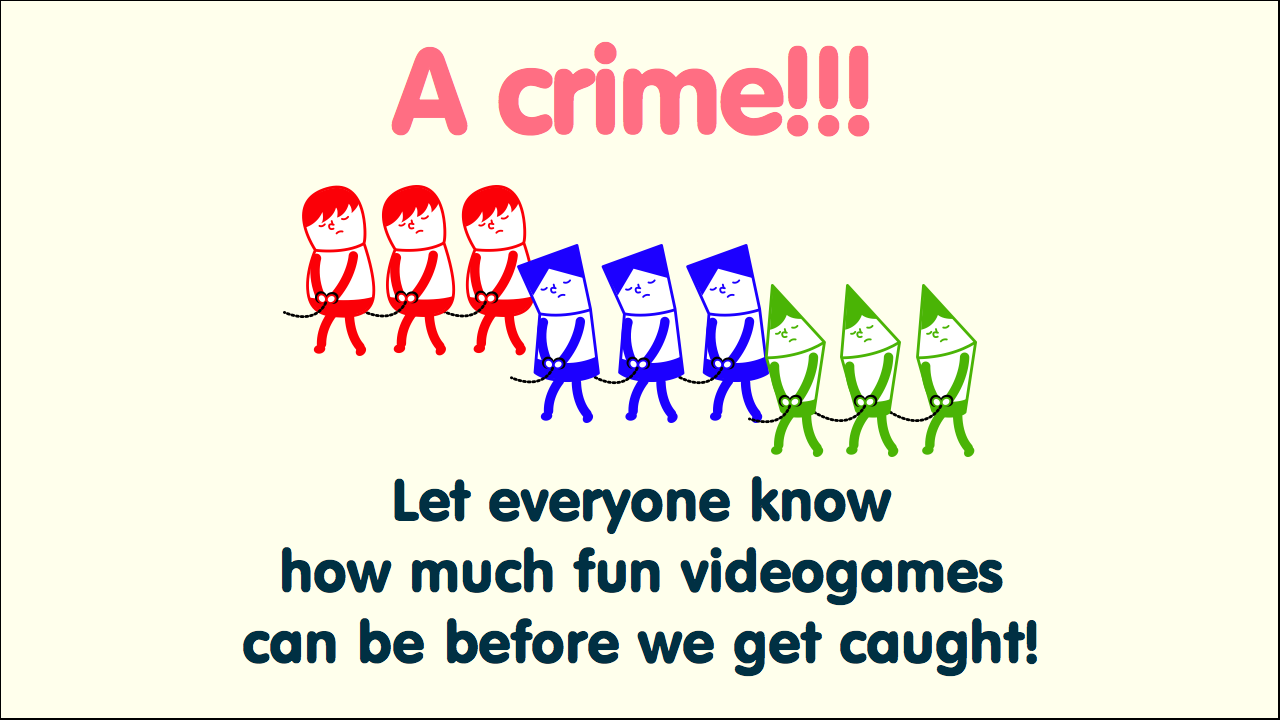
Videogames should be able to overcome language and cultural barriers. It’s almost a crime if we don’t let others know how fun videogames are.
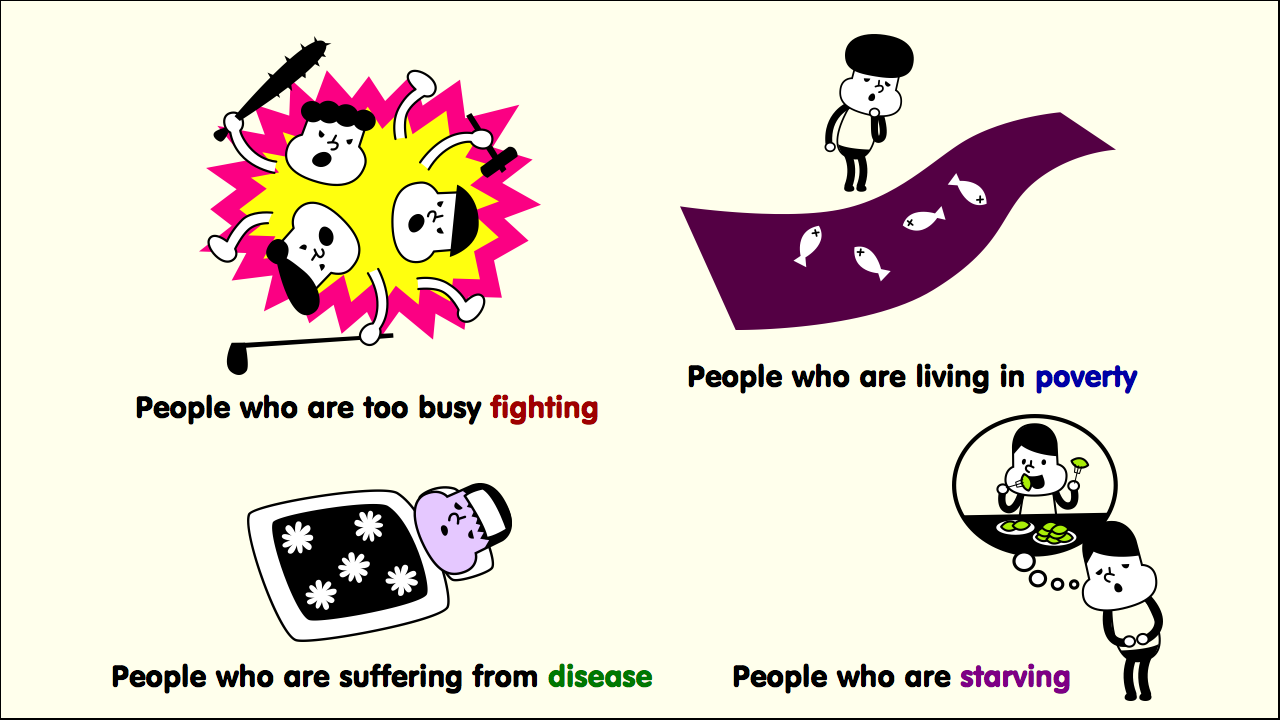
Who should we reach out to first? Of course, to the people who never play videogames — those out of reach of that joy because of factors like these. Sadly, there are still many people who are doing their best just to maintain a normal life.
By far, the number of these people is much greater than those who can enjoy videogames. This is all the more reason why we need to set off to share the joy of videogames with these people. So let’s actually go do it!! However, when we arrive, we’ll likely soon find that it’s just as difficult as we had expected.
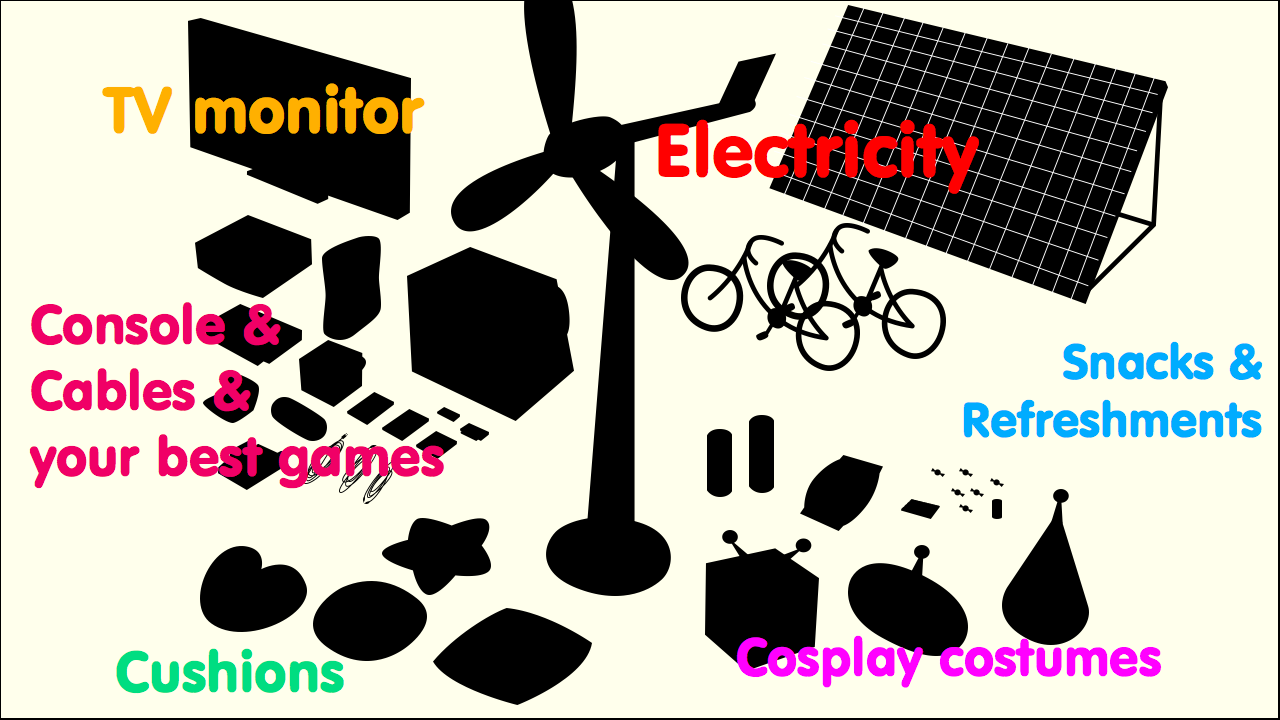
This is simply because videogames are a luxury that requires specific conditions and environments in order to play. But we can’t just give up on this. We’re people with a love for videogames.
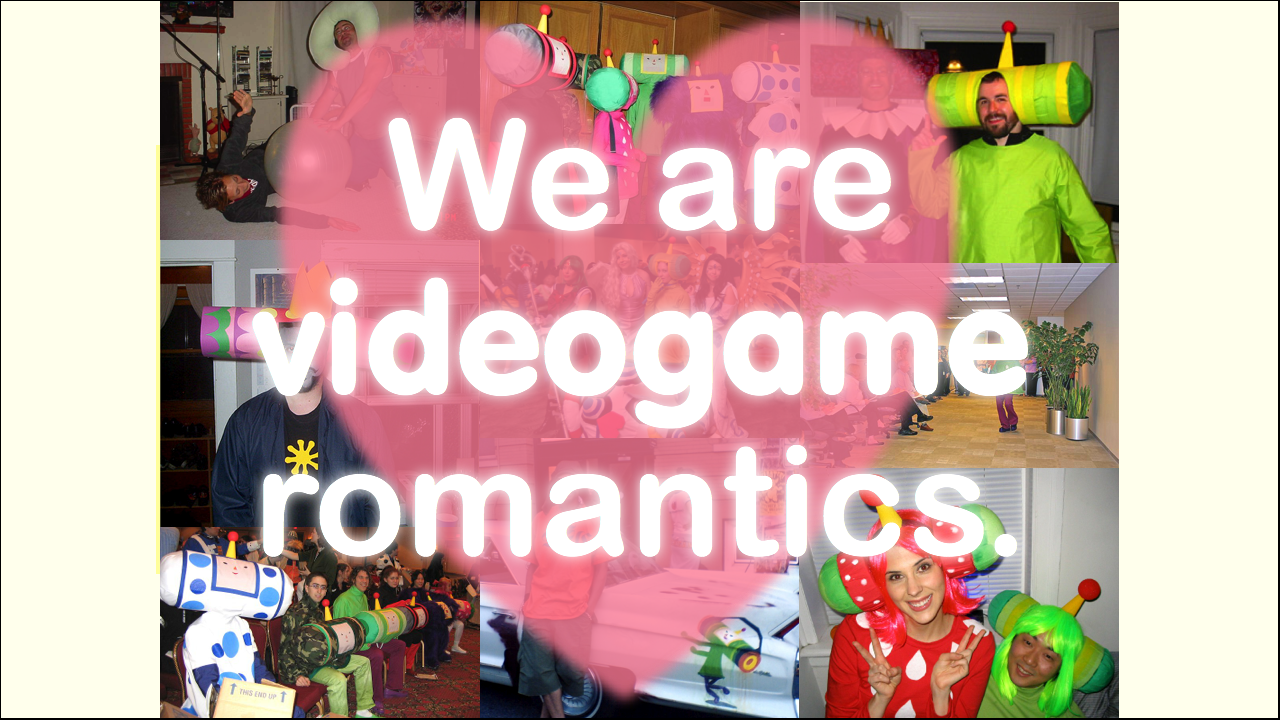
We’re videogame romantics with a naïve, pure, wonderful, and silly Love. It’s not too complicated. All we need to do is concentrate on creating the necessary environments to play videogames.
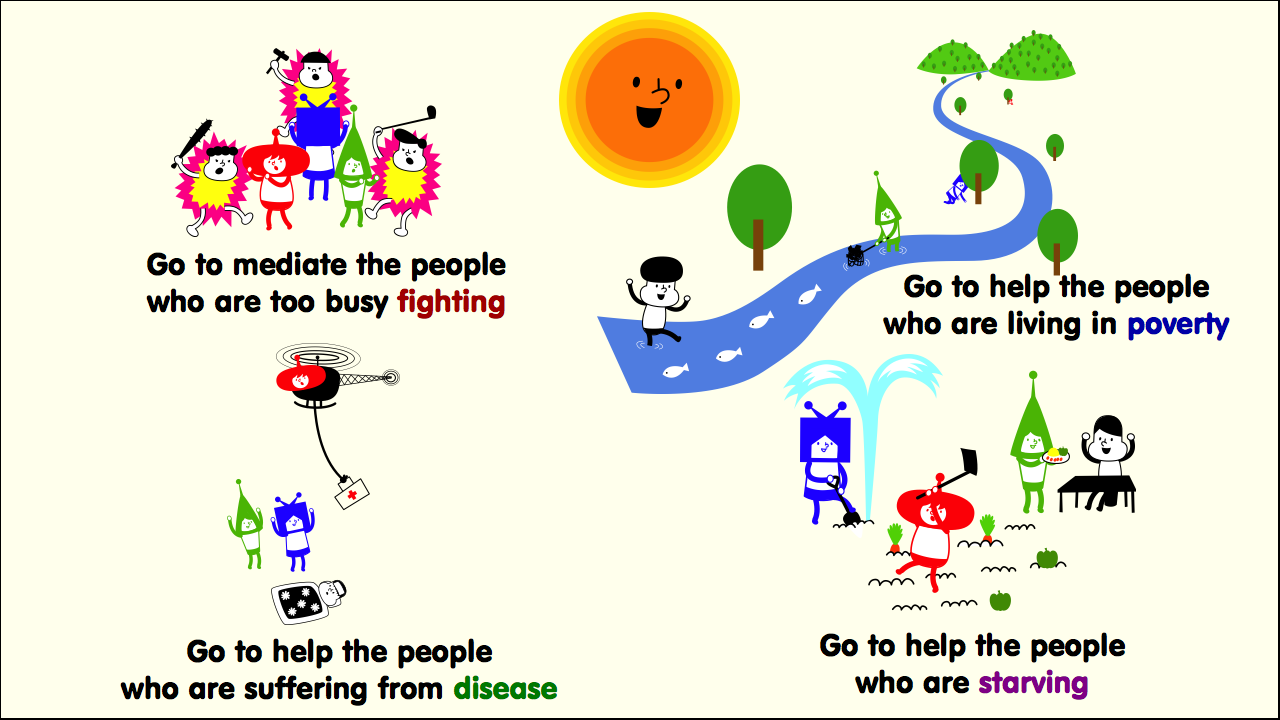
I believe that “Peace” is just about living everyday of life in good health, but it often sounds overly serious. Also, because this concept is so mundane, we tend to over look it.
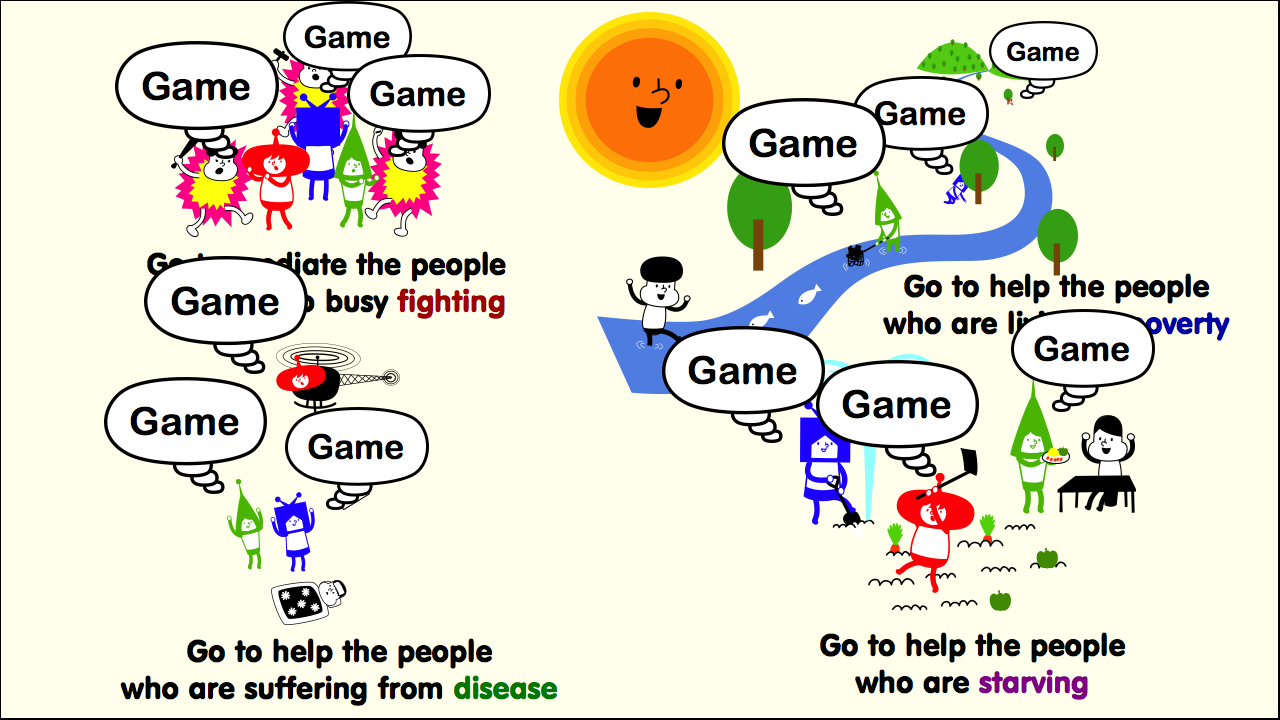
Therefore, it gives us all the more reason to work towards our simple and yet silly goal of “solving problems to let people enjoy videogames”.
Focusing on actions that lead to a peaceful world sounds more realistic to me than working on world peace from scratch. Then again, some people may say I’m a dreamer.
Actually, the goal doesn’t have to be about videogames. It can be anything such as sports, art, movies, or anything.

Videogames are an especially good form of entertainment open to everyone, but at the same time they’re a luxury that requires money and specific conditions. This is why I came up with this idea.
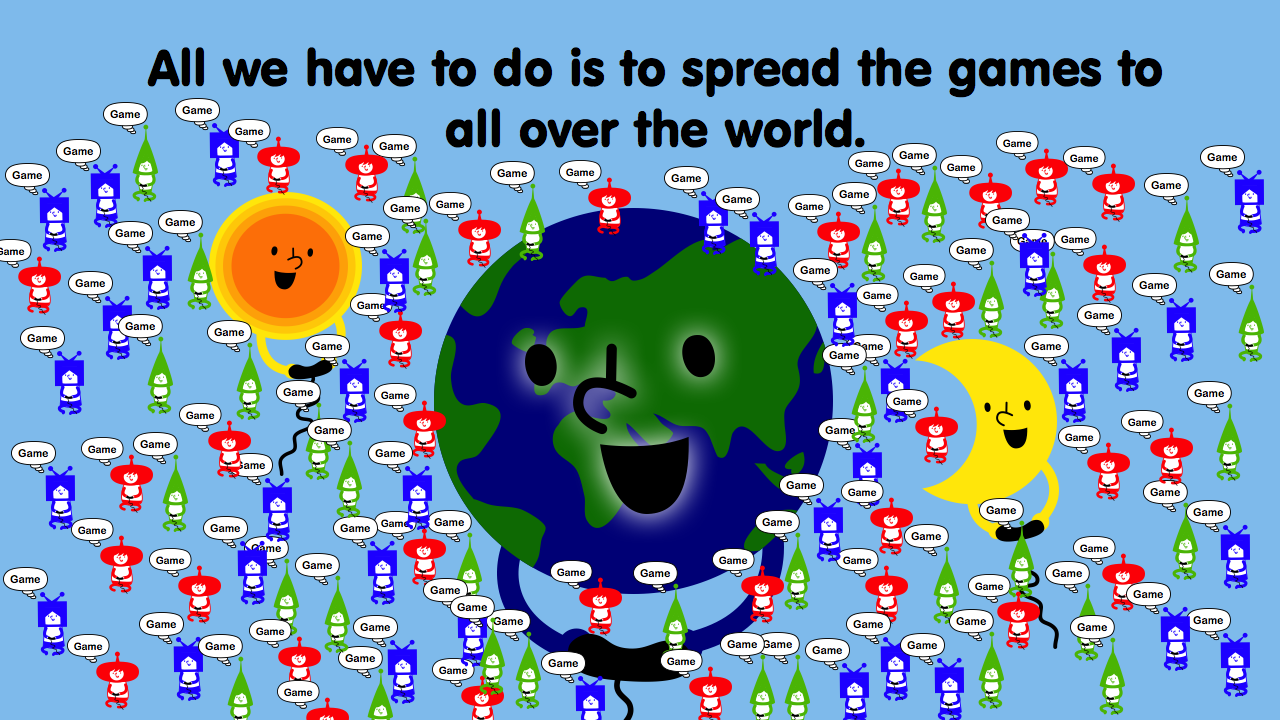
The videogames that we make and play exist only in times of peace, and are therefore proof of peace. That existence itself is worthy of a Nobel Peace Prize. All we have to do is to spread this to other parts of the world. To be honest, the thought that this all sounds too idealistic has occurred to me while I was writing this presentation. But I don’t believe that it is absolutely impossible. Maybe I’m being too naïve here.

As developers, there is something we must keep in mind. If we are going to all the trouble of spreading the joy of videogames to people around the world…
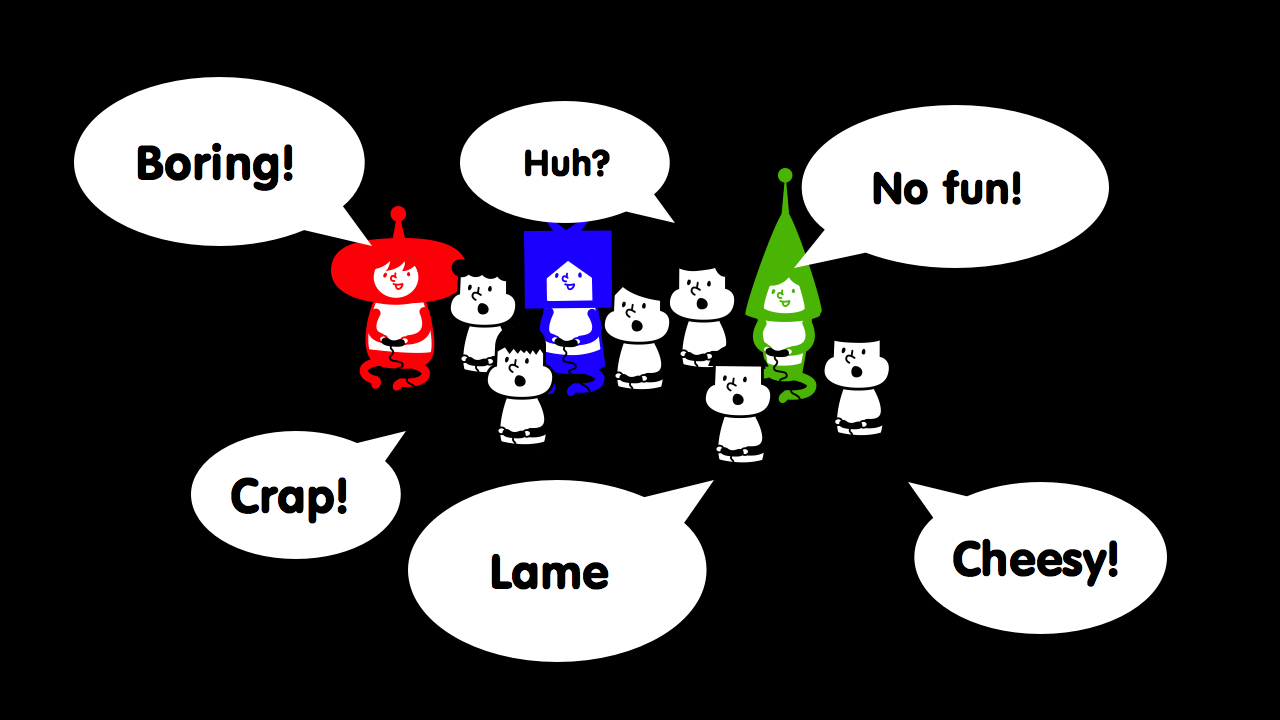
…we must continually do our best to create videogames that people all around the world will have no complaints about like, “This is not fun!” or “This is boring!”.
Clearly, this is not an idea for a video game. Why? Because video games require a certain level of peace before you can play them, or make them, in the first place. So, the very existence of video games is a symbol of peace. Making a better environment for playing games is identical to spreading peace. That’s what I wanted to say in my presentation.
Unfortunately, after the presentation, I heard that the audience wanted to see an actual game idea, so maybe they didn’t grasp completely what I wanted to say. But, I think this presentation explains my point of view about videogames very well. Videogames are not necessities of life. The first thing that survivors of earthquakes or hurricanes need isn’t videogames ― regrettably for game developers.
And also, to really enjoy videogames, you have to prepare. You need a sofa, snacks, drinks, computer, and electricity. Also, you need a comfortable temperature — not so hot, not so cold. It’s really tough. You need a lot of money, both to play and to make videogames. So I used the word “luxury” in my presentation. Even though they are expensive, we want to play videogames, because we love them. And because we love them, we want to make them too.
By the way, what do you love about videogames?
I don’t play videogames these days because I don’t own a console. This doesn’t mean that I don’t like videogames. Actually, I like them very much. So why don’t I own a console? I’m not sure of the exact reason, but maybe I’ve come to prefer making games over playing games. Also: I can’t find a place to store the controller.

The original Nintendo had a place on either side to store the controllers. This is an important thing. I hope they get it right in the next generation of consoles. Maybe motion controllers like Kinect will become mainstream and physical controllers will disappear. That would be disappointing for me, though.
The existence of physical controllers is one of the reasons why I love videogames. Motion controllers and touch interfaces aren’t bad, but I don’t much like them. Maybe that’s because I’m a game player from an older generation.
Why do I like physical controllers? Needless to say, interactivity is the most important thing. But, the existence of a physical controller might be more important to me than interactivity. I’m not sure if I can explain it well:
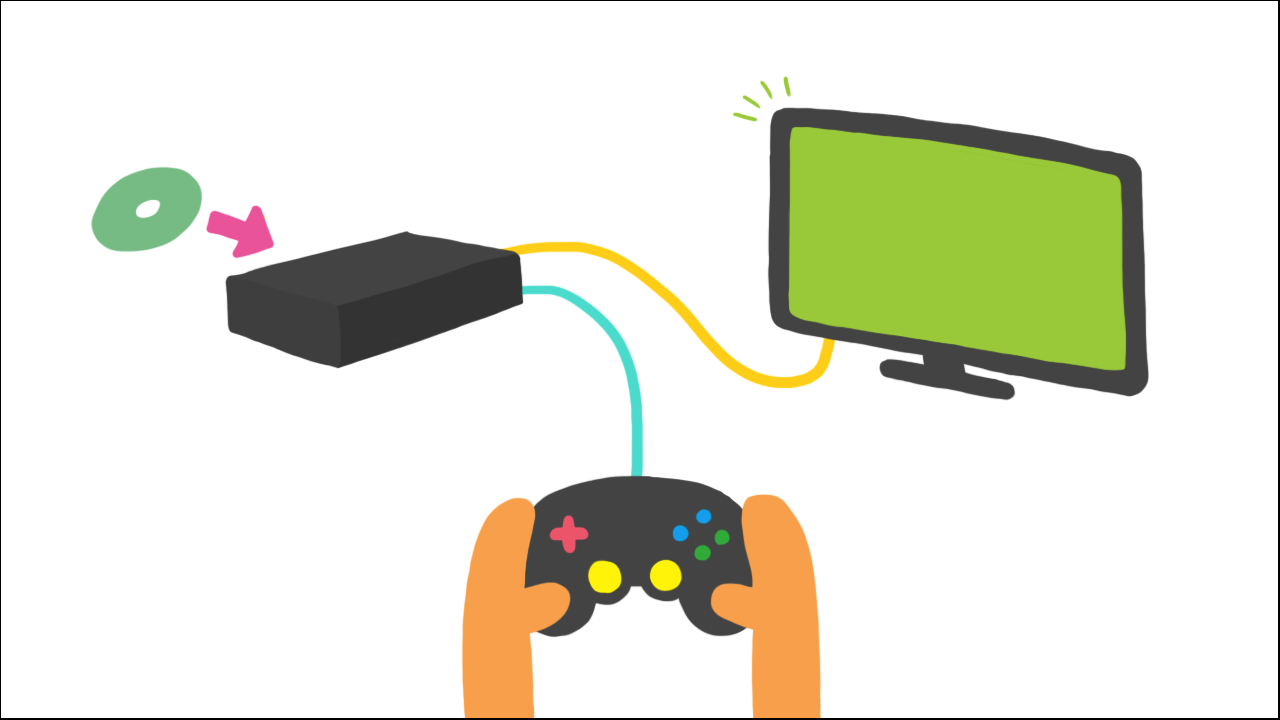
You put a game into the console, then the game appears on the television, and finally you enjoy it by using the controller.
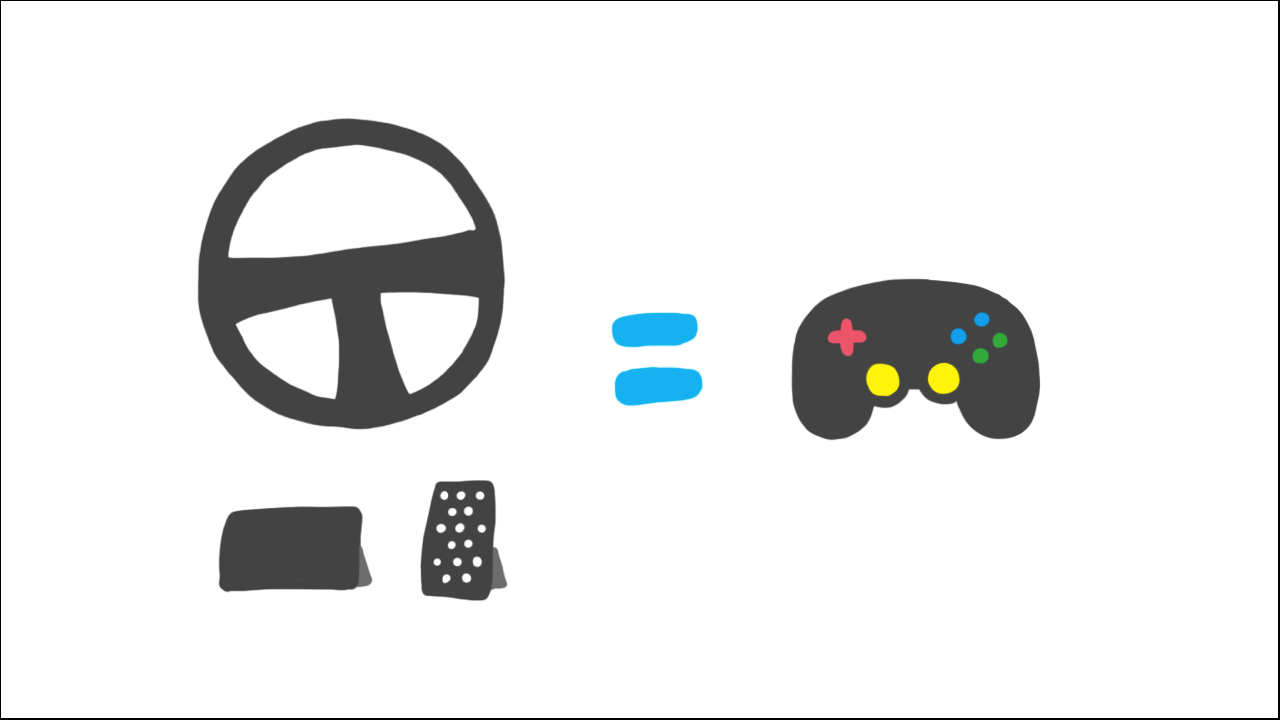
In the case of a racing game, the joystick is the steering wheel, the buttons are the accelerator and the brake.
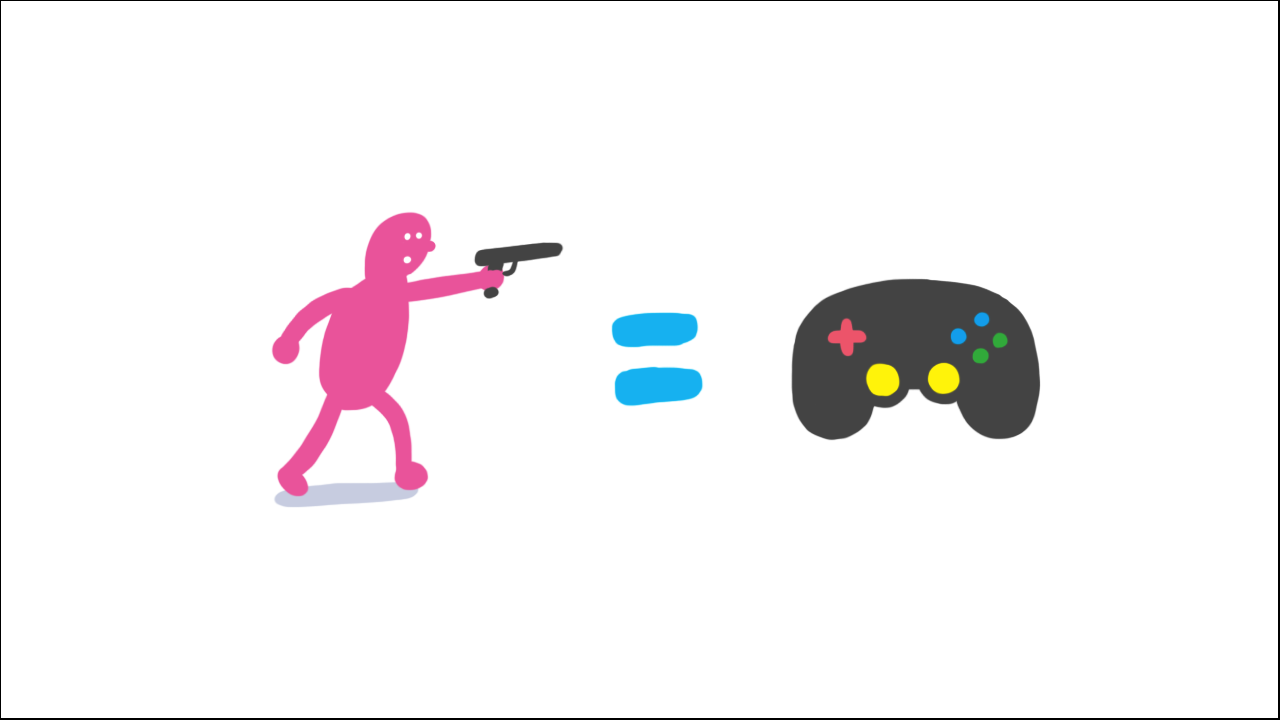
In the case of an FPS, the joystick will be your character himself, and he moves in sync with the tilting of the joystick. And the buttons are the guns.
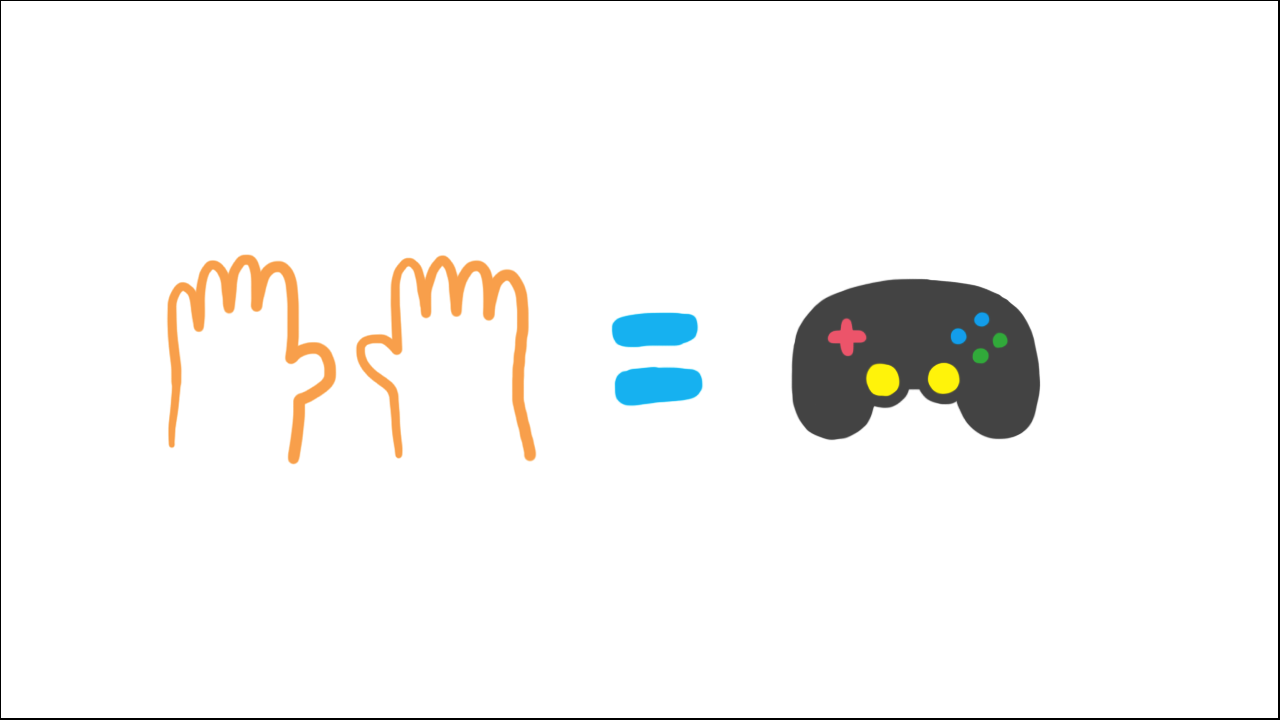
In the case of Katamari Damacy, the two joysticks are the two hands. When you roll the katamari, it feels like you roll it with your own two hands.
All I’m doing here is just explaining how to play some videogames. This is interesting to me though. We can play various videogames with various gameplay using just one controller — and it doesn’t feel weird. Moreover, when we’re playing, we hardly ever look at the controller.

When people hold a controller, I can really feel them using their subconscious brains. Their imaginations fill in the gaps, and turn a controller into something totally different. They don’t even consciously realize it. It’s a great behaviour. Good job, Sir Brain.
When I’m actually developing videogames, I spend a long time matching the behavior of the joystick and the character. I want to get close to the ideal in my brain. Adjusting the feel of the controls was one of the most important aspects of Katamari and Noby Noby Boy.
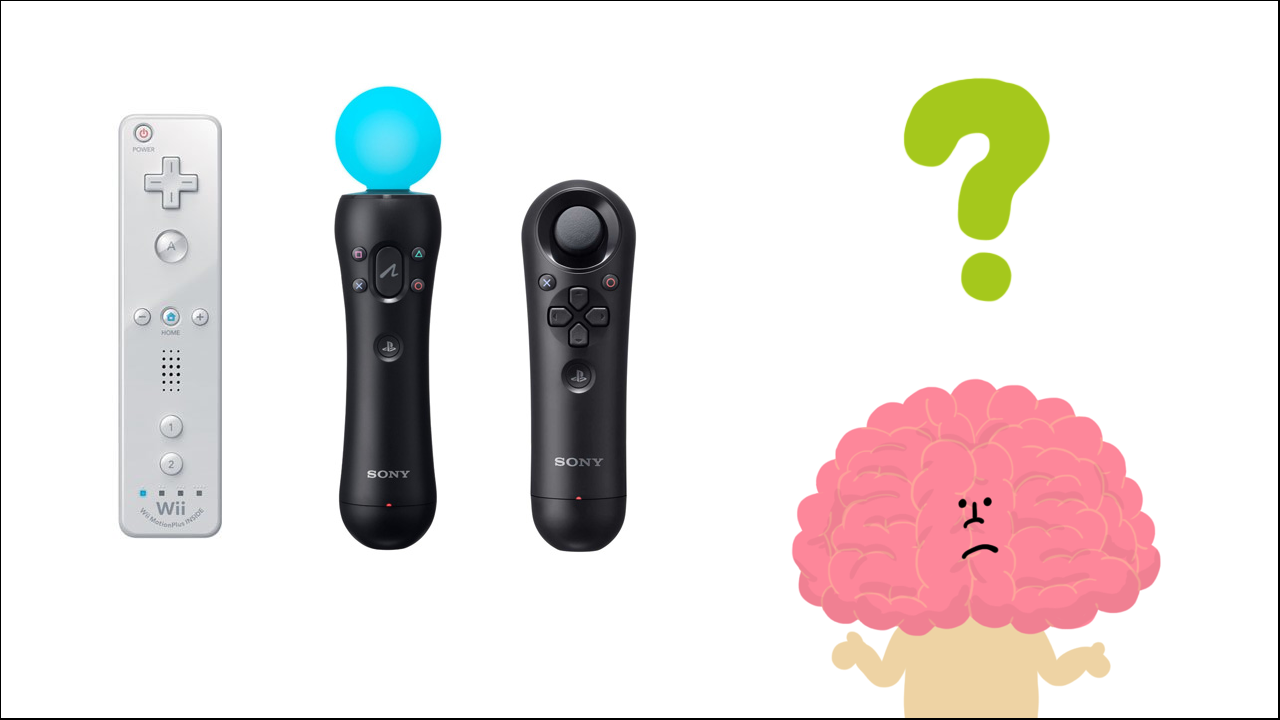
So I don’t understand why we have motion controllers like the Wii or PlayStation Move. Maybe they thought: the game software is boring, so let’s fix the situation by changing the game hardware. I guess they wanted to make an easier and more intuitive controller.
But as a result — and I can’t explain it well — I miss the satisfaction of using my subconscious brain to connect totally different experiences. I’m not saying this is true for everyone. It’s just a personal impression. Although I’m sure we use our brains when playing with a motion controller, it’s hard to feel your brain because it’s overwhelmed by your body movement.
I also don’t much enjoy games on smart phones. Touch screens are very easy to understand, but they are too direct for me. Human beings are simple creatures, but on the other hand we can be very complicated. So I don’t think we should make everything clear and direct. We should also give room for thought, imagination, and feeling.
I think we should not make light of the power of our imaginations. Human beings are amazing because we can enjoy various videogames using a controller which is totally unrelated to each game’s premise. Actually, I’d like to use this videogame controller for things besides videogames.

I’d like to adjust the tilt of my shower head with the controller.
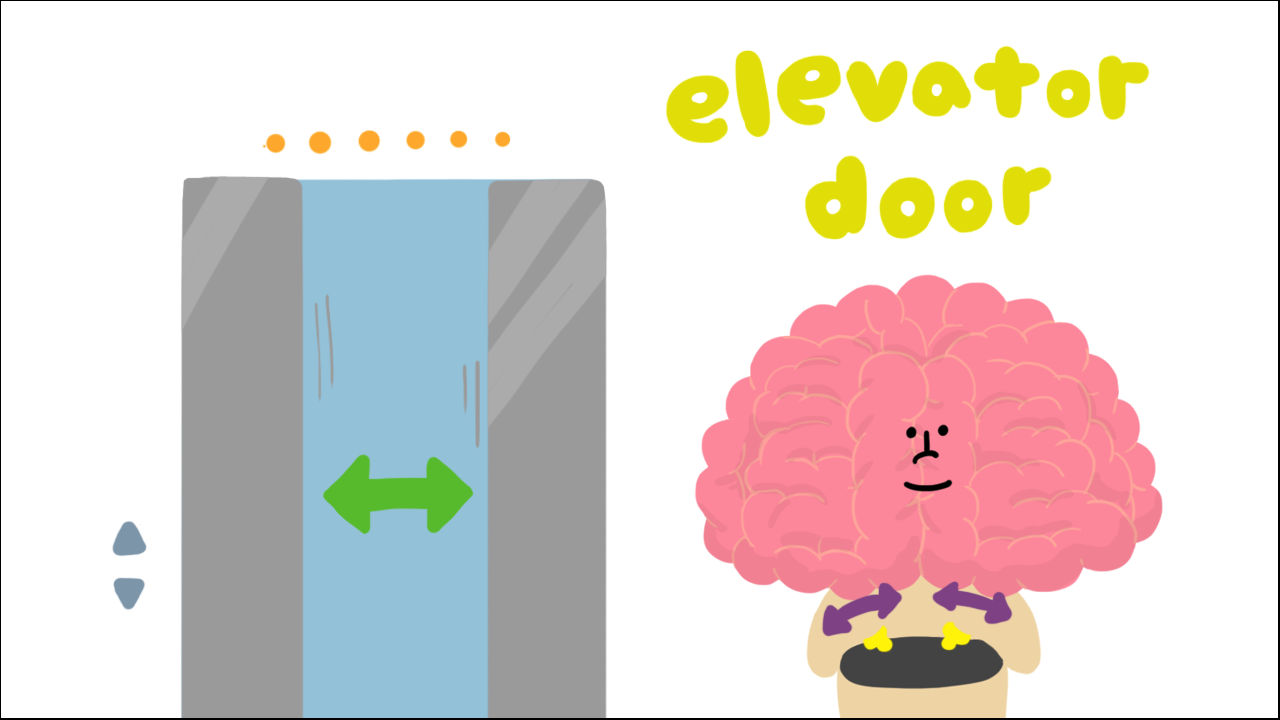
Also, I’d like to control the elevator door. Yeah, I think you might have already noticed something. This is not really a story about videogames. It’s changed into a story about our amazing brain.
I’d like to continue the story about the brain a little bit more. I’m often asked about FPSs in interviews with game magazines or web sites. I guess they want my impression of violence in videogames. My opinion about FPSs is a little bit complicated. It’s fun to throw something at a target. And it’s also fun to dodge something thrown at you. So, from the aspect of game design:
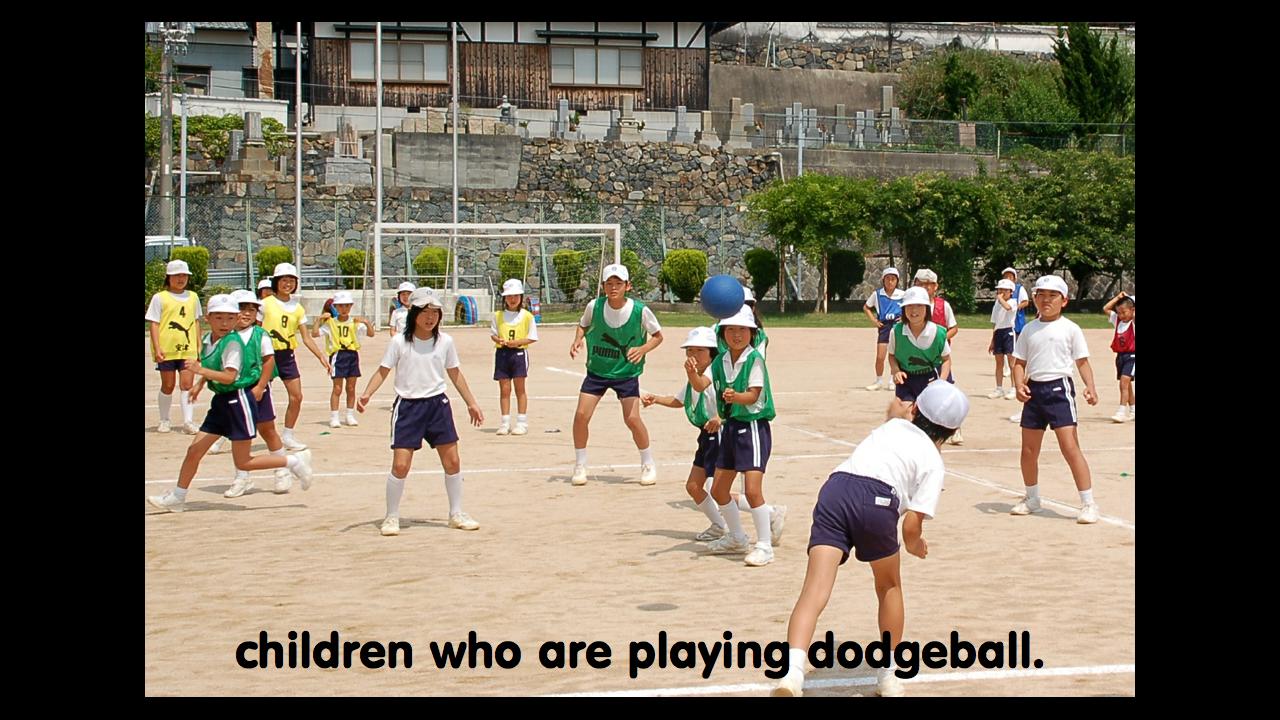
I think an FPS is almost the same as dodgeball. Lots of people like baseball or golf. And you can see archery, curling, and rifle shooting at the Olympics. Apparently, throwing something at a target seems to give pleasure to humans. And if the targets move around and attack us too, that’s even more fun. This is exactly what an FPS is.
Dodgeball is a popular game for children in Japan. I think there are some people who think dodgeball is a bit dangerous, but there are no people who say, “Stop it!” because it is too violent. I think dodgeball is a bit violent. So if we think it’s fun, perhaps this sort of behaviour is natural. Of course, other games besides FPSs are called “violent” too, but the question, “What do you think about violence in video games?” may no longer be meaningful. We always see such behaviour in daily life, and we enjoy doing it, too. Basically, I’m not really sure if we can call it “violence” at all. So, I can say “no!” to extreme violence, but it’s hard to provide a clear answer about violence in game design. It’s one of our natural instincts.
But some FPSs have a problem. From an enjoyment point of view, these games are just an extension of dodgeball. And yet they often use something tragic, like war. It’s totally stupid.
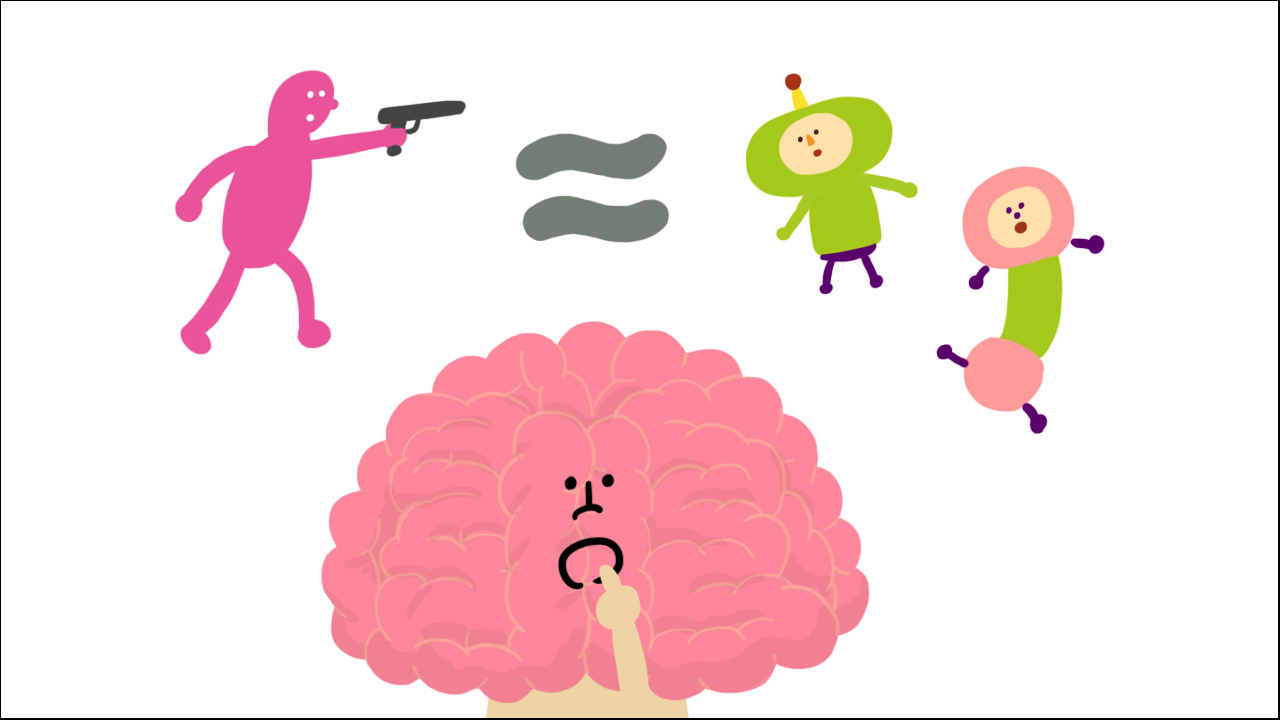
However, when you view FPSs from a game design perspective, in some ways they might be close to my ideal of game design.
I got a job at Namco in 1999. I couldn’t figure out which project I wanted to join, at that time, so I started to think of a game that I wanted to play and make.
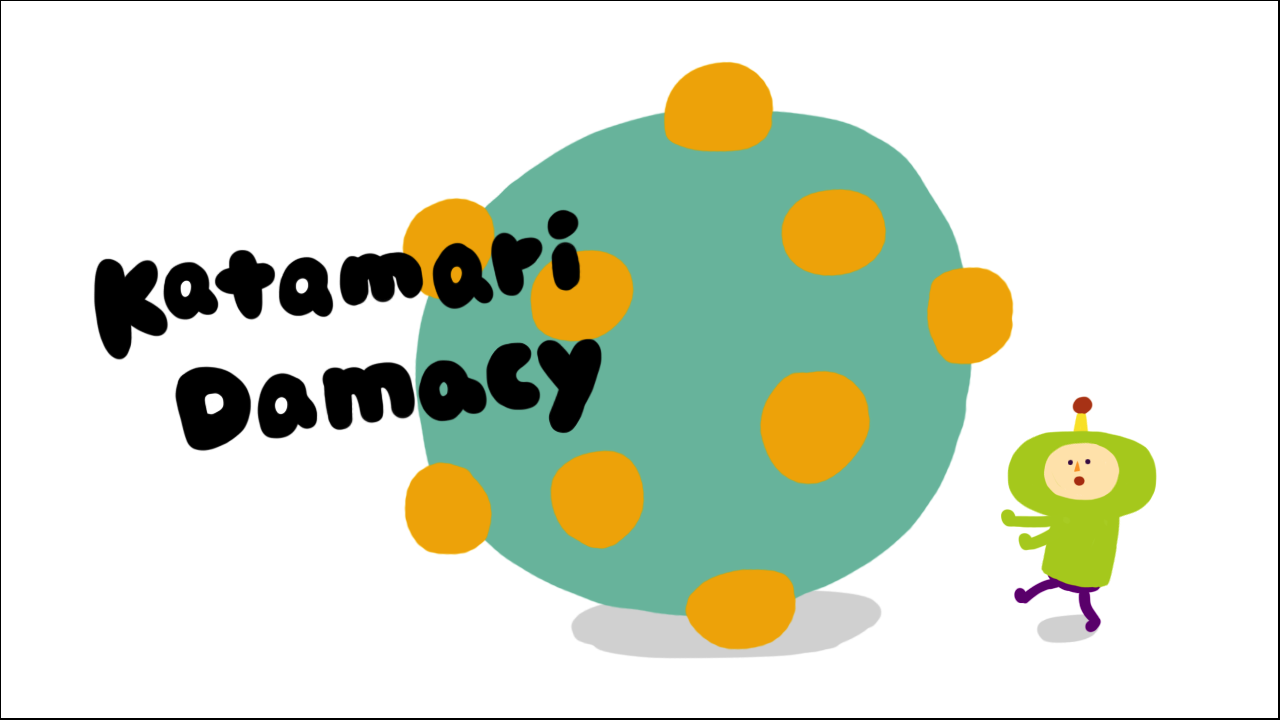
That’s when I got the idea for Katamari Damacy. I was trying to think of an experience that only video games can provide.
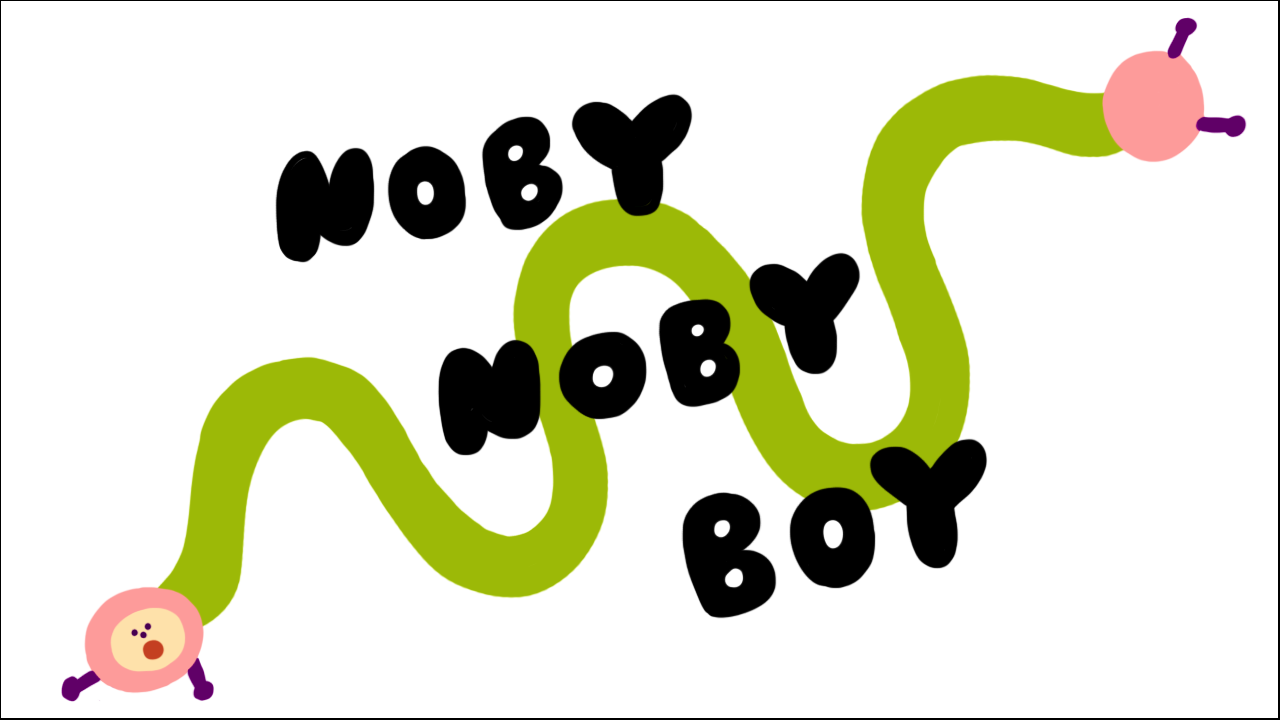
With Noby Noby Boy, my goal was to make a game where the fun comes directly from our instincts. Of course I think game design and game mechanics are very important. But these are logical things. I wanted to make a game where the fun comes from something more primitive. One of the reasons why I like videogames is because they can overcome the language barrier. So, I thought I might be able to provide a videogame that overcame the age and gender barriers too — if I was able to find this primitive fun that can’t be explained with words. We could play it forever without ever getting bored.
From this perspective, you might say that the game I want to make is similar to an FPS. Therefore, I shouldn’t be prejudiced. I should play FPSs, or maybe dodgeball. I would probably pick dodgeball though. It’s important to think of things from many perspectives — not just the perspective of a maker of games, but also from the perspective of a regular person. You might notice something you would have otherwise missed.
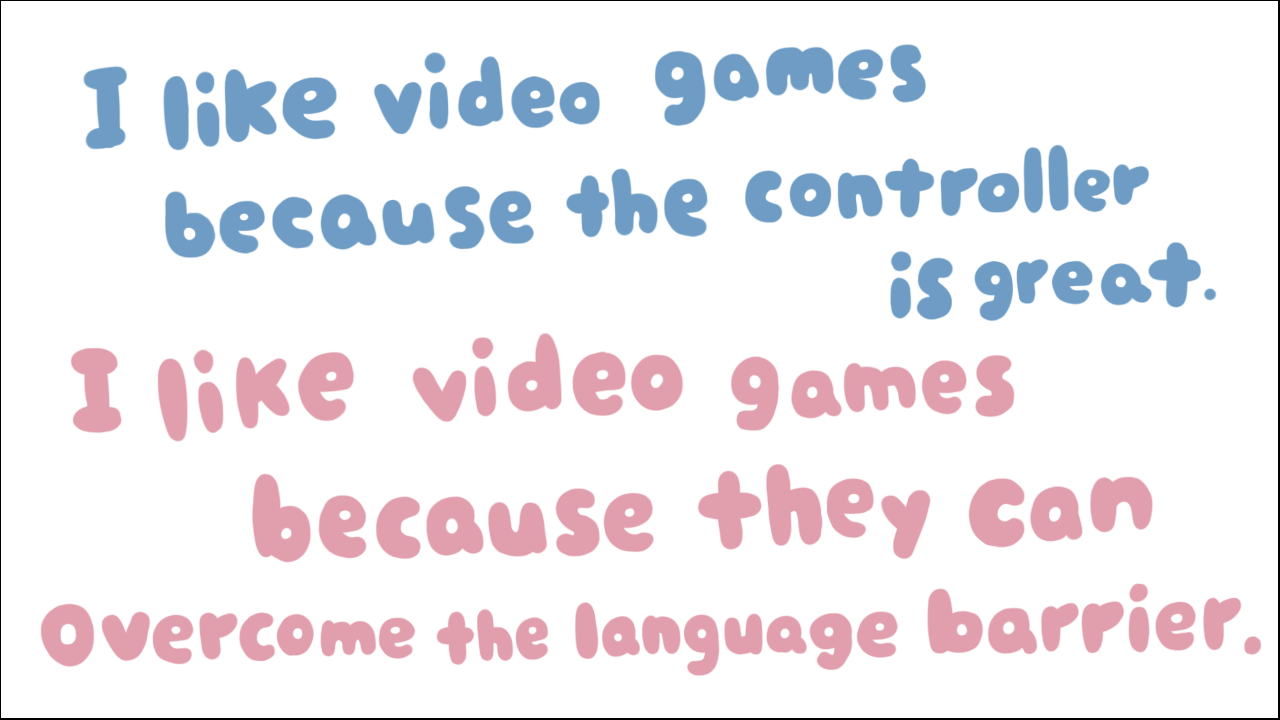
I like videogames because the controller is great.
I like videogames because they can overcome the language barrier.
And this is the most important reason: I like videogames because they’re fun. It’s a very simple reason. When you encounter a fun game, you start to imagine those game experiences happening in the real world. It’s very interesting.
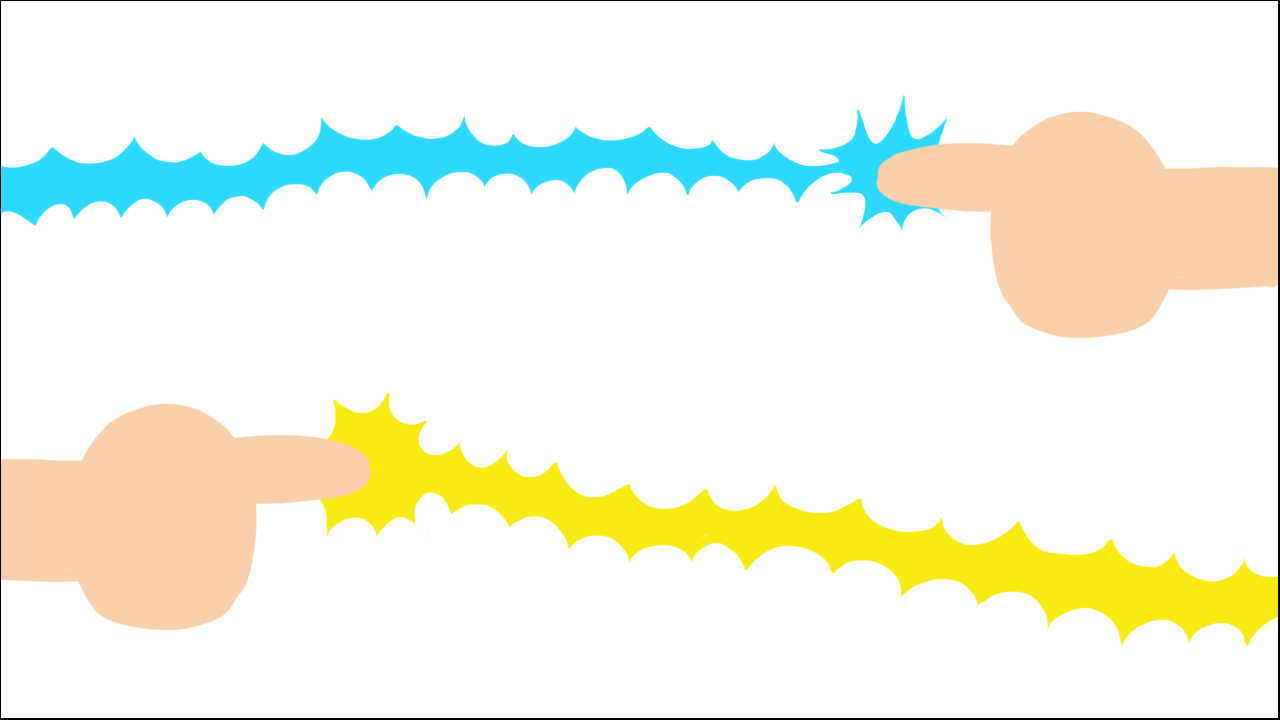
I wish I had a super beam that shot out of my finger. Even though I’m 37 years old, I think about it almost every morning. Then again, maybe not this comes from game.
So I think video games have the potential to be better still, and more fun. Last August, in a New York, I joined an event called The BabyCastles Summit. It was an event where we attempted to play existing games in new ways. Actually, it was like a laboratory.
We projected the game screen of Pac-Man all over the room. That’s it. Yes, it’s so simple. But the behaviour of Pac-Man in the corner of the room, or in a spot where the game screen projects onto a curtain — that’s so interesting, and the unreal feeling of being surrounded by Pac-Man was really enjoyable.
This is a side scrolling shooter which was divided onto multiple monitors. To play it, you have to physically walk from monitor to monitor. In the end, we were able to use 17 monitors. This game is a side scroller, but the first player to arrive at the last monitor is the winner, so it’s also a racing game. All the players were running around in the room. This was my ideal playing style.
All my ideas were simple. But I think I was able to make a new kind of fun. Nowadays there are a lot of new input methods. But here we changed the output method, just a little — and look at how the possibilities expanded. For Pac-Man, all we did was redesign the map to fit on walls, and then project it onto them. I know these ideas are difficult to bring to businesses like console or mobile gaming. But, videogames are not just console or mobile games.

What does this mean? It means we should make a game arcade where we can play games like this. Not just a temporary exhibition, a permanent game arcade, with a lot of games that can only be played there. We should gather game ideas from game makers all over the world, and make something brilliant. Of course we ensure game makers share the profits. And I think we can hold educational workshops at this arcade, to make video games a part of our daily lives. In this way, we will have more experiences with things that are outside of our daily lives. These days, so many of our experiences come from the Internet. I think that a real place where people can visit will be much more special.
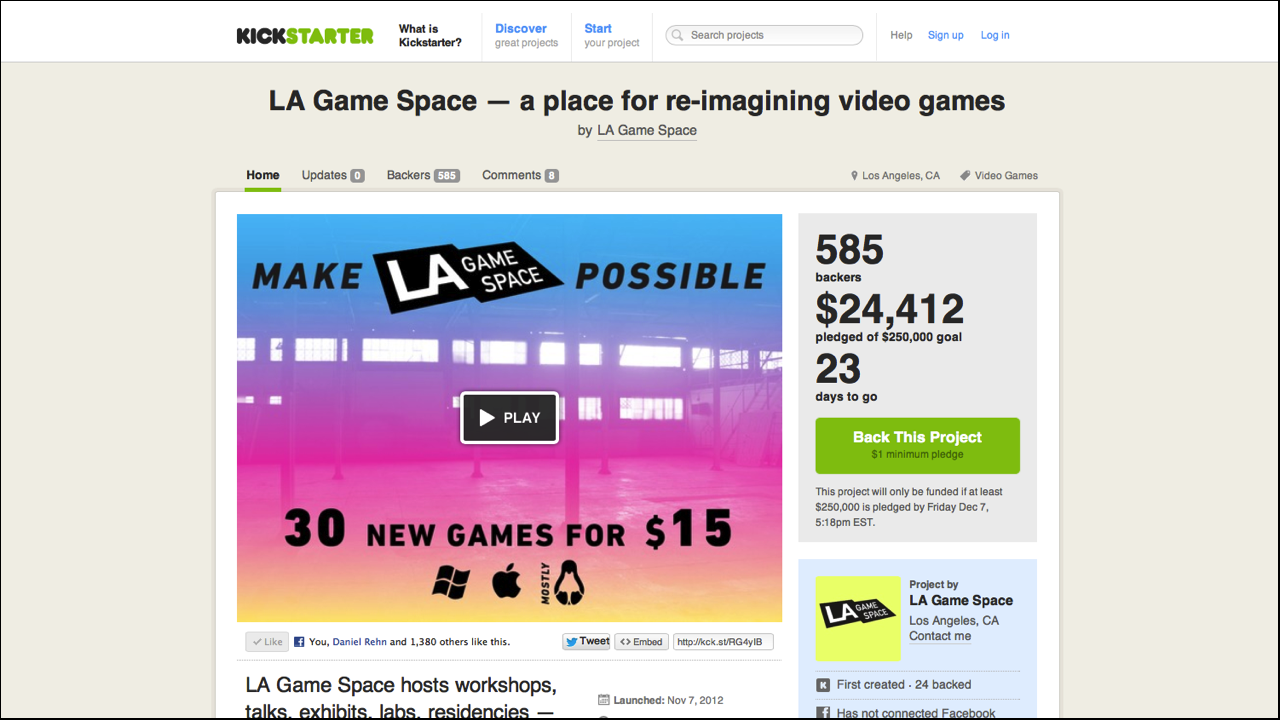
And it seems that there are people who are thinking the same thing — a Kickstarter project called LA Game Space was started just last week. Please donate if you’re interested.
Let me summarize.
I’ve had a question for a long time. Sometimes we appreciate the fun and beauty of the world through movies, art, and photographs. Why do these things make the world feel beautiful and fun?
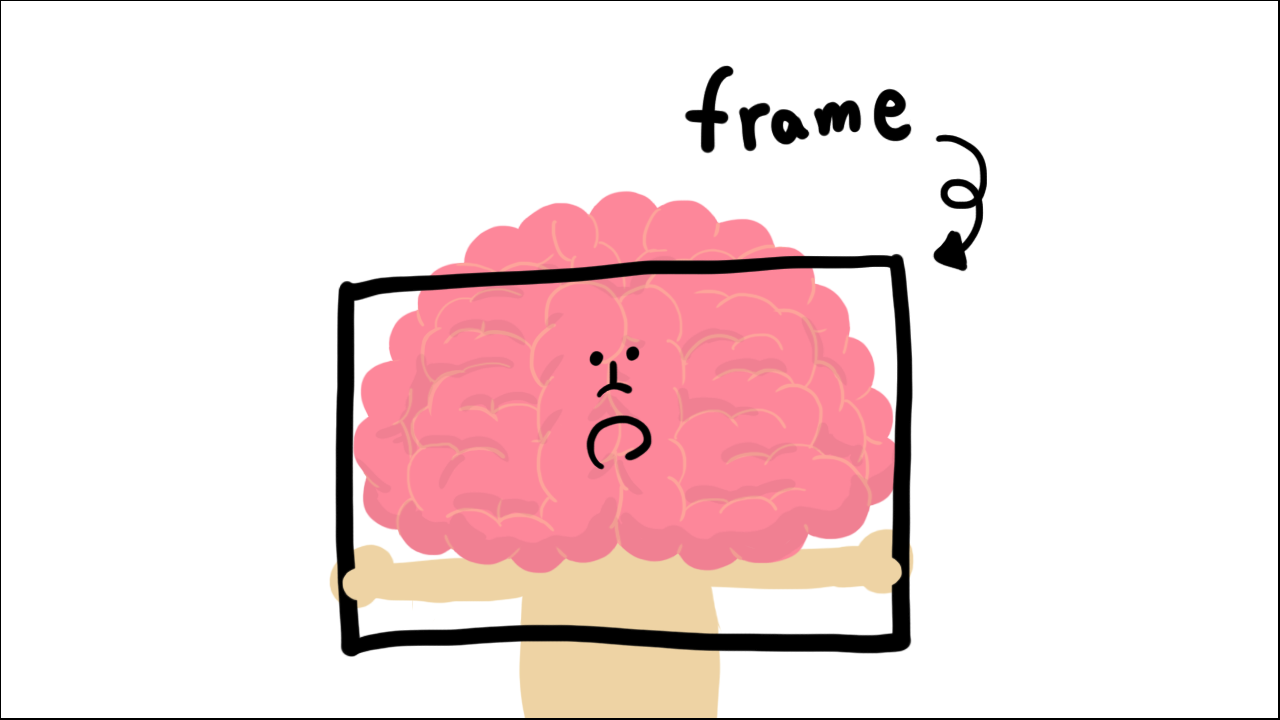
I think it’s because of their frames. By delimiting our field of view, our attention is easily focused. Human eyes are so efficient. We don’t have frames like in a movie or a picture. So maybe we don’t focus on the special things that are close to us.
For instance, we should take notice of everything in our daily lives, ask questions about it, and then take action. This isn’t limited to just game developers either. We make an effort to know only what we want to know. I doubt we will make great games with this attitude.

So, we need to wear glasses like this.
And there is another issue. I play videogames because I like them. I make videogames because I like them. These seem like similar things, but they are actually completely different. Sadly, even if you love videogames, it’s still hard to make a great, fun, and silly game.
Every day I look for the next new game idea, but it’s pretty hard to find.

That’s why I need these glasses.
Looking to the future, we have no idea what kind of video games are going to fit. Maybe FPSs will live for a while longer. The genre doesn’t matter. If it’s fun, that’s what’s important. But on top of being fun, if there is also interaction with the real world, I think that would be amazing. By playing this game, if people change their way of thinking, or even their lives, that would be amazing.
Maybe, in this way, it’s possible for games to change the world. To be honest, if we don’t try to make a game like this, maybe the reason for having videogames will fade away. That’s what I’m afraid of. We’re not making games just to kill time.
There are many things that we have to think about. Returning to the presentation I showed at the beginning — for the moment, well, at least until the next century, it’s important to maintain an environment where people can continue to play videogames. As game developers, I think we should take more notice of real society. I expect, hiding in there, are many clues and ideas for videogames.

See more posts about: Katamari Damacy, Keita Takahashi, Noby Noby Boy, Venus Patrol Presents






